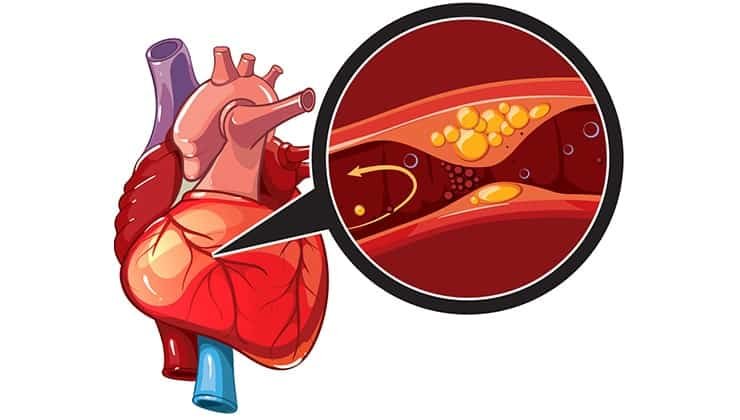Coronary artery disease (CAD) is also known as coronary heart disease (CHD) or ischemic heart disease. It is a medical condition characterized by restricted or blocked blood arteries that provide blood to the heart muscle. CAD is the most common kind of heart disease and a major cause of heart attacks.
The major cause of CAD is atherosclerosis, which is the slow accumulation of plaque (cholesterol, fatty deposits, and other substances) within the coronary arteries.
Over time, this plaque hardens and narrows the arteries, limiting blood flow to the heart. In certain situations, the plaque ruptures or forms blood clots, resulting in a sudden blockage of an artery and heart attack.
Causes of Coronary Artery Disease
The main cause of CAD is atherosclerosis. The exact mechanisms are complicated and multifaceted, including a number of factors:
- Cholesterol: High levels of low-density lipoprotein (LDL) cholesterol, sometimes known as “bad” cholesterol, contribute considerably to the formation of arterial plaques.
- Tobacco: Smoke causes damage to the artery walls and increases plaque development.
- Hypertension: High blood pressure puts strain on the coronary arteries, making them more vulnerable to atherosclerosis.
- Diabetes: High blood sugar levels can harm the blood arteries and nerves that regulate the heartbeat.
- Chronic inflammation: It is commonly caused by infections or other disorders, can damage the artery walls.
Risk factors for coronary artery disease
Several risk factors increase the chances of having CAD. Some are adjustable, and others are beyond control:
- Diet: A high consumption of saturated fats, trans fats, and cholesterol can raise blood cholesterol levels.
- Physical Inactivity: A lack of exercise leads to obesity and elevated cholesterol levels.
- Obesity: Excess body weight, particularly in the belly, is associated with high cholesterol, hypertension, and diabetes.
- Smoking: Tobacco smoking is a major risk factor for CAD.
- Excessive alcohol: Drinking may raise blood pressure and cholesterol levels.
Symptoms of coronary artery disease
CAD symptoms can differ person to person and may not become obvious until the condition has progressed to an advanced stage. Common symptoms include:
- Angina: The most prevalent symptom is angina, which is defined as chest pain or discomfort caused by a lack of blood supply to the heart muscle. It might feel like pressure, squeezing, burning, or fullness.
- Shortness of Breath: When the heart is unable to pump enough blood to satisfy the body’s demands, you may feel short of breath, particularly during vigorous exertion.
- Heart Attack: A severe blockage in the coronary artery can cause a heart attack, which is characterized by strong chest pain, shortness of breath, perspiration, nausea, and lightheadedness.
- Fatigue: Extreme exhaustion without a clear explanation might be an indication of the heart’s inability to adequately pump blood.
Diagnosing Coronary Artery Disease
Diagnosing CAD includes different procedures and tests:
- Medical History and Physical Exam: The doctor will evaluate your medical history, risk factors, and symptoms before doing a physical examination.
- Electrocardiogram (ECG or EKG): This test measures electrical activity in the heart and can reveal anomalies.
- Stress testing: It is exercising on a treadmill or stationary cycle while monitoring the heart rate to detect problems with blood flow.
- Echocardiogram: It is an ultrasound of the heart that reveals its anatomy and function.
- Cardiac catheterization and angiogram: A dye is injected into the coronary arteries to reveal blockages using X-ray imaging.
- Blood tests: These can evaluate cholesterol, blood sugar, and inflammatory markers.
Treatment for coronary artery disease
Treatment and management of CAD involve a combination of lifestyle changes, medications, and medical procedures.
Dr.Nikhil’s Treatment Algorithm for CAD
- Family History, Obesity, Smoking (Hidden CAD) – Lifestyle changes
- Risk factors (Hidden CAD) – Risk factor treatment + Lifestyle changes
- Mild and Moderate CAD – Heart Medications + Risk factor treatment + Lifestyle changes
- Severe Disease 1 or 2 vessels – Stents + Heart Medications + Risk factor treatment + Lifestyle changes
- Severe Disease 3 vessels or more – Surgery + Heart Medications + Risk factor treatment + Lifestyle changes
Surgical Procedures: Angioplasty and Stent Placement: This minimally invasive technique includes inflating a balloon to unblock the blocked artery and inserting a stent to keep it open.
Coronary Artery Bypass Grafting (CABG): It is a surgical operation in which a healthy artery or vein from another section of the body is used to bypass a blocked coronary artery.
Enhanced External Counterpulsation (EECP): This non-invasive method stimulates the development of new tiny blood arteries (collaterals), which improves blood flow to the heart.
Prevention of Coronary Artery Disease
Preventing CAD involves dealing with controllable risk factors through lifestyle modifications and medical therapies.
- Regular medical check-ups: They can assist in monitoring and managing risk factors such as hypertension, cholesterol, and diabetes.
- Healthy lifestyle choices: Adopting a heart-healthy diet, participating in regular physical exercise, quitting smoking, and managing stress are all important measures toward preventing CAD.
- Medication: Taking drugs as prescribed by your healthcare professional in order to treat current problems and decrease risk.
Coronary artery disease is a critical health concern that requires correct treatment. Understanding the causes, symptoms, risk factors, and treatment choices is critical for prevention and successful management.
Individuals can significantly reduce their risk of CAD and enhance their quality of life by leading a heart-healthy lifestyle, following medical advice, and being health-conscious.
Schedule your consultation today for Cardiac care at Heart360 Care. Our expert Dr. Nikhil P.J.Theckumparampil is a Gold medalist in MBBS with 17 years of experience in the U.S. He is trained and published on LVAD and heart transplantation.









